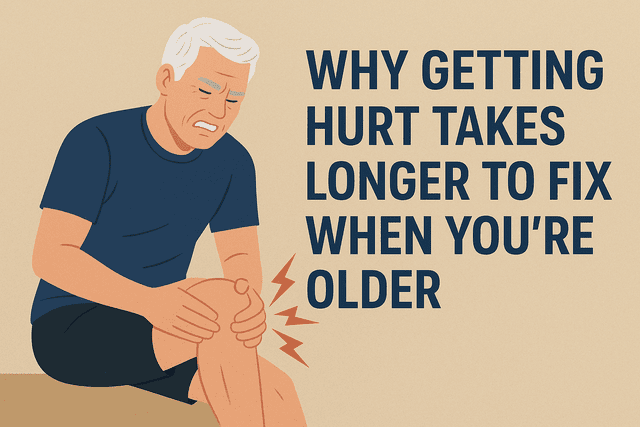
Why Getting Hurt Takes Longer to Fix When You’re Older
Remember when you were eight and scraped your knee? Within a week, it was completely healed and you had forgotten all about it. Fast forward to watching your grandparents deal with a simple cut that seems to take forever to close up properly. There’s actually a scientific reason why healing slows down as we get older, and it has everything to do with how our bodies change over time.
Table of Content
What Actually Happens When You Get Injured
When your body gets hurt, whether it’s a cut, bruise, or broken bone, it immediately starts a complex repair process. Think of it as your body’s construction crew getting to work. Blood rushes to the area to clean out any bad stuff, special cells come in to rebuild tissue, and your immune system works overtime to prevent infection.
In young people, this construction crew works super fast and efficiently. All the workers know exactly what to do, they have plenty of energy, and they can work around the clock. But as we age, this repair crew starts to slow down, and there are fewer workers available to get the job done.
Why Your Body’s Repair System Gets Slower
The main reason healing takes longer in older adults comes down to cellular changes. As people age, their cells don’t divide and multiply as quickly as they used to. New skin cells, bone cells, and blood vessels all take more time to form. It’s not that the body stops trying to heal – it just can’t work at the same speed.
Blood circulation also changes with age. Older adults often have reduced blood flow to different parts of their body, which means the healing nutrients and oxygen that injuries need don’t arrive as quickly. Poor circulation can turn a minor wound into a weeks-long healing process.
The immune system, which plays a huge role in fighting off infection during healing, becomes less effective over time. This means that older adults are more likely to develop complications from even small injuries, which can really slow down the recovery process.
The Role of Chronic Health Conditions
Many older adults deal with health conditions that make healing even more challenging. Diabetes is a big one – high blood sugar levels can damage blood vessels and nerves, making it much harder for wounds to heal properly. Some diabetic seniors end up with wounds that don’t heal for months.
Heart disease affects how well blood circulates through the body, which directly impacts healing. Arthritis and other inflammatory conditions can also interfere with the body’s repair processes. When someone is dealing with multiple health issues, their body has to work extra hard just to maintain normal functions, leaving less energy for healing injuries.
Many seniors find that aging in place with professional help becomes necessary when dealing with these slower healing times and chronic conditions. Having trained caregivers who understand how to properly care for wounds and monitor healing progress can make a significant difference in recovery outcomes.
Medications That Slow Down Healing
Older adults typically take more medications than younger people, and some of these can interfere with healing. Blood thinners, which many seniors take for heart health, can make bleeding last longer and slow down the initial stages of wound repair.
Steroids, often prescribed for inflammatory conditions, can significantly delay healing by suppressing the immune system. Even common over-the-counter pain relievers, when taken regularly, can interfere with the body’s natural inflammatory response that’s needed for proper healing.
Some medications also affect sleep quality, and getting good rest is crucial for healing. During deep sleep, the body releases growth hormones that help repair damaged tissue. When sleep is disrupted, healing slows down even more.
How Nutrition Affects Recovery Time
As people get older, they often don’t eat as well as they should. Maybe they have trouble chewing, food doesn’t taste as good as it used to, or they just don’t feel as hungry. But proper nutrition is essential for healing.
Protein is especially important because it provides the building blocks for new tissue. Vitamin C helps with collagen production, which is needed for skin and blood vessel repair. Zinc plays a role in immune function and wound healing. When older adults don’t get enough of these nutrients, their bodies simply can’t heal efficiently.
Dehydration is another common problem in seniors that can slow healing. Water is needed for almost every function in the body, including carrying nutrients to injury sites and removing waste products from healing tissues.
The Impact of Reduced Physical Activity
Many older adults become less active due to joint pain, balance issues, or fear of falling. While being careful makes sense, too little movement can actually slow down healing. Physical activity helps improve circulation, which brings healing nutrients to injured areas faster.
Bed rest used to be the standard recommendation for injuries, but we now know that gentle movement usually helps healing progress more quickly. The key is finding the right balance between rest and activity, which can be tricky for older adults to figure out on their own.
What This Means for Recovery Expectations
Understanding why healing takes longer helps set realistic expectations. A cut that might heal in a few days for a teenager could take several weeks for an 80-year-old. A broken bone that heals in six weeks for a young adult might take three months or more in an older person.
This doesn’t mean older adults can’t heal – they absolutely can. It just means the process takes more time and often requires more careful attention. Keeping wounds clean, eating well, staying hydrated, and following medical advice becomes even more important with age.
The good news is that knowing about these changes means families and healthcare providers can plan better. They can watch more carefully for signs of infection, make sure nutrition needs are met, and provide the right kind of support during the healing process.
Getting older definitely changes how the body handles injuries, but with proper care and realistic expectations, most older adults can still recover well from injuries. The key is understanding that healing is a process that naturally slows down with age, and adjusting care accordingly.


